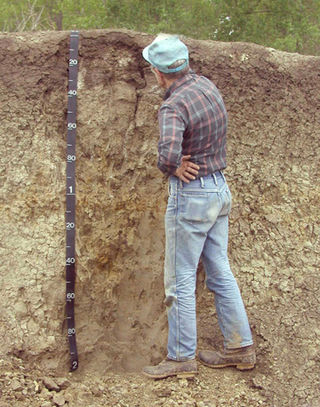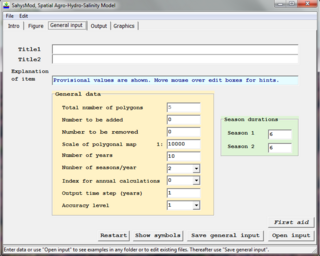
Hydrology is the scientific study of the movement, distribution, and management of water on Earth and other planets, including the water cycle, water resources, and drainage basin sustainability. A practitioner of hydrology is called a hydrologist. Hydrologists are scientists studying earth or environmental science, civil or environmental engineering, and physical geography. Using various analytical methods and scientific techniques, they collect and analyze data to help solve water related problems such as environmental preservation, natural disasters, and water management.

Physical geography is one of the three main branches of geography. Physical geography is the branch of natural science which deals with the processes and patterns in the natural environment such as the atmosphere, hydrosphere, biosphere, and geosphere. This focus is in contrast with the branch of human geography, which focuses on the built environment, and technical geography, which focuses on using, studying, and creating tools to obtain, analyze, interpret, and understand spatial information. The three branches have significant overlap, however.

Soil science is the study of soil as a natural resource on the surface of the Earth including soil formation, classification and mapping; physical, chemical, biological, and fertility properties of soils; and these properties in relation to the use and management of soils.

Hydraulic engineering as a sub-discipline of civil engineering is concerned with the flow and conveyance of fluids, principally water and sewage. One feature of these systems is the extensive use of gravity as the motive force to cause the movement of the fluids. This area of civil engineering is intimately related to the design of bridges, dams, channels, canals, and levees, and to both sanitary and environmental engineering.

Hindawi is a publisher of peer-reviewed, open access, scientific journals currently active in scientific, technical, and medical (STM) literature. It was founded in 1997 in Cairo, Egypt, and purchased in 2021 for $298 million by John Wiley & Sons, a large US-based publishing company.
Geographic information systems (GISs) have become a useful and important tool in the field of hydrology to study and manage Earth's water resources. Climate change and greater demands on water resources require a more knowledgeable disposition of arguably one of our most vital resources. Because water in its occurrence varies spatially and temporally throughout the hydrologic cycle, its study using GIS is especially practical. Whereas previous GIS systems were mostly static in their geospatial representation of hydrologic features, GIS platforms are becoming increasingly dynamic, narrowing the gap between historical data and current hydrologic reality.

SahysMod is a computer program for the prediction of the salinity of soil moisture, groundwater and drainage water, the depth of the watertable, and the drain discharge in irrigated agricultural lands, using different hydrogeologic and aquifer conditions, varying water management options, including the use of ground water for irrigation, and several crop rotation schedules, whereby the spatial variations are accounted for through a network of polygons.
Sensors is a monthly peer-reviewed, open access, scientific journal that is published by MDPI. It was established in June 2001. The editors-in-chief are Vittorio M.N. Passaro, Assefa M. Melesse, Alexander Star, Eduard Llobet, Guillermo Villanueva and Davide Brunelli. Sensors covers research on all aspects of sensors and biosensors. The journal publishes original research articles, short notes, review articles, book reviews, product reviews, and announcements related to academia.
MDPI is a publisher of open-access scientific journals. It publishes over 390 peer-reviewed, open access journals. MDPI is among the largest publishers in the world in terms of journal article output, and is the largest publisher of open access articles.
The International Association of Hydrological Sciences (IAHS) is a non-profit, non-governmental scientific organization committed to serving the science of hydrology and the worldwide community of hydrologists. The IAHS was established in 1922, and presently claims a membership in excess of 9,000 with members in over 150 countries.
Physics is a natural science that studies matter and the forces that act upon it. Physics may also refer to:
The following outline is provided as an overview of and topical guide to hydrology:

Seyed Majid Hassanizadeh is a professor of hydrogeology at Utrecht University, where he heads the Hydrogeology group at the Faculty of Geosciences. His research focuses on flow of fluids and transport of solutes and colloids in porous media, through theory development, experimental studies, and modeling work. In particular, he focuses on two-phase flow, reactive transport in variably-saturated porous media, transport of micro-organisms, and biodegradation.

The Open Access Scholarly Publishing Association (OASPA) is a non-profit trade association of open access journal and book publishers. Having started with an exclusive focus on open access journals, it has since expanded its activities to include matters pertaining to open access books and open scholarly infrastructure.
Frontiers Media SA is a publisher of peer-reviewed, open access, scientific journals currently active in science, technology, and medicine. It was founded in 2007 by Kamila and Henry Markram. Frontiers is based in Lausanne, Switzerland, with other offices in the United Kingdom, Spain, and China. In 2022, Frontiers employed more than 1,400 people, across 14 countries. All Frontiers journals are published under a Creative Commons Attribution License.

Agrometeorology is the study of weather and use of weather and climate information to enhance or expand agricultural crops or to increase crop production. Agrometeorology mainly involves the interaction of meteorological and hydrological factors, on one hand and agriculture, which encompasses horticulture, animal husbandry, and forestry.
Science Publishing Group (SPG) is an open-access publisher of academic journals and books established in 2012. It has an address in New York City and many of its journals are named American Journal of..., but the company is actually based in Pakistan. The company has been criticized for predatory publishing practices. As of 2019, it publishes 430 journals in various fields.
The social sciences are academic disciplines concerned with society and the relationships among individuals within a society.
Land is a monthly peer-reviewed, open access, scientific journal that is published by MDPI. It was established in 2012. The journal explores land use/land change, land management, land system science, and landscape-related issues. The editor-in-chief is Andrew Millington.








